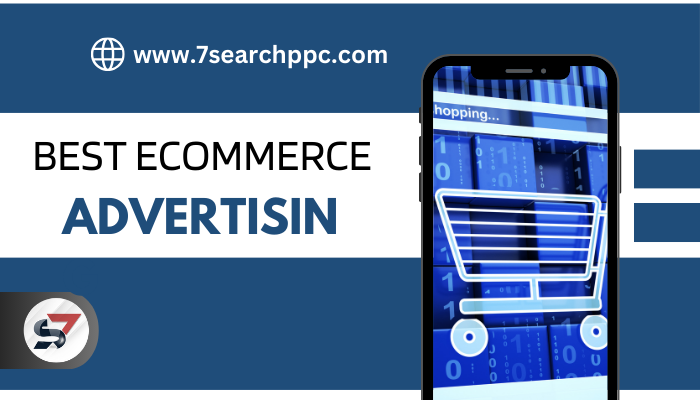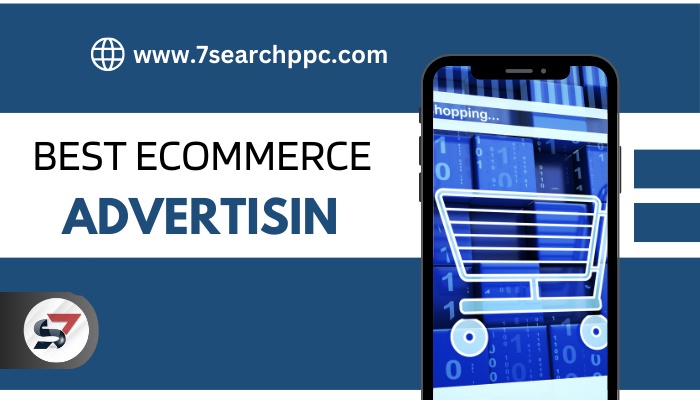In the ever-evolving landscape of ecommerce advertising plays a pivotal role in driving brand awareness, attracting traffic, and ultimately boosting sales. As we step into 2024, it’s crucial for online businesses to stay ahead of the curve with effective advertising strategies. Let’s explore the seven best approaches to elevate your ecommerce game:

1. Social Media Promotions: Raising Brand Awareness and Special Deals
Social media platforms are bustling hubs where businesses can connect with their target audience. Leverage platforms like Instagram, Facebook, and Twitter to create engaging content, showcase your products, and run promotions. Engage with your followers, share user-generated content, and offer exclusive deals. Remember, social media isn’t just about selling; it’s about building relationships.
2. Search Ads: Acquiring New Customers with Precision
Search engine advertising remains a powerful tool. Craft targeted ads using relevant keywords and placements. Optimize your campaigns for search engines like Google and Bing. Focus on high-intent keywords related to your products. Remember, the right ad at the right moment can lead to conversions.
3. Retargeting Campaigns: Nurturing Potential Customers
Don’t let potential customers slip away! Implement retargeting campaigns that follow up with website visitors. Show them personalized ads featuring the products they viewed. Use dynamic retargeting to display specific items they left in their cart. Remind them of what they loved and encourage them to complete their purchase.
4. Omnichannel Messaging: Tailoring Communication to Customer Behavior
Today’s consumers interact with brands across multiple channels—email, SMS, push notifications, and more. Create an omnichannel strategy that aligns with your customer lifecycle. Send personalized messages based on their behavior. For instance, if a customer abandons their cart, trigger an automated email with a gentle nudge to complete the purchase.
5. Affiliate Partnerships: Amplifying Reach Through Influencers
Collaborate with influencers and niche websites to expand your reach. Influencer marketing allows you to tap into their engaged audiences. Identify influencers whose values align with your brand. Whether it’s a fashion blogger or a tech guru, their endorsement can drive traffic and conversions.
6: Content Marketing
Content marketing revolves around creating and distributing valuable, relevant content to attract and retain a clearly defined audience. For ecommerce businesses, this could include blog posts, product guides, videos, and more, aimed at educating and inspiring potential customers while improving search engine visibility through SEO optimization.
7: Mobile Advertising
With the increasing prevalence of mobile devices, optimizing advertising campaigns for mobile users is more important than ever for ecommerce marketing. By ensuring ads are responsive and tailored to the mobile experience, businesses can capture the attention of on-the-go consumers and drive conversions effectively.
8. Personalized Ads: Harnessing First-Party Data
Data is your secret weapon. Collect and analyze customer data to create hyper-targeted ads. Use first-party data from your website, email subscribers, and past purchases. Craft personalized messages that resonate with individual preferences. Whether it’s a birthday discount or a product recommendation, personalization drives engagement.
Remember, successful ecommerce ads aren't about throwing money at every channel—it’s about strategic allocation and continuous optimization. Stay agile, test new approaches, and adapt to changing consumer behaviors. As you implement these strategies, monitor performance, tweak your campaigns, and watch your ecommerce business thrive in 2024!
9.Search Engine Marketing (SEM)
Search Engine Marketing involves promoting websites by increasing their visibility in search engine results pages through paid advertising. By bidding on keywords relevant to their products or services, ecommerce businesses can ensure their ads appear at the top of search results, increasing the likelihood of attracting qualified leads and driving conversions.
FAQs
Q1. What makes 7Search PPC stand out as an effective advertising solution for ecommerce businesses?
7Search PPC offers targeted solutions to reach the right audience at the right time, ensuring maximum ROI for advertisers.
Q2.How to use influencer marketing for ecommerce?
The influencer recommends or endorses your product to their audience. You compensate them financially, either by sponsoring them, hiring them as a spokesperson, or hiring them as an employee. Influencer marketing is content marketing strategy.
Q3.What is the role of content marketing in e-commerce?
Content marketing is an inbound digital marketing strategy that focuses on bringing your potential customers to you. You can accomplish this by serving them high-quality content wherever they may be seeking answers — on search engines, social media platforms, product review sites, etc.
Q4. Why is mobile advertising essential for ecommerce businesses in 2024?
With the increasing prevalence of mobile devices, optimizing advertising campaigns for mobile users is crucial for capturing their attention and driving conversions.
Q5. How can retargeting help ecommerce businesses increase conversion rates?
Retargeting allows businesses to re-engage potential customers who have previously visited their website, increasing the likelihood of conversion.


No comments yet